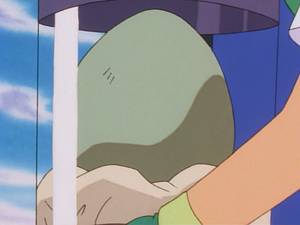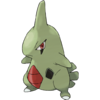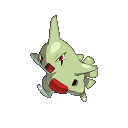|
|
|
|
|
|
|
|
|
|
|
|
|
|
|
Height
2'00"
Imperial
|
0.6 m
Metric
|
2'00"/0.6 m
Red-Striped
|
0'0"/0.0 m
Blue-Striped
|
0'0"/0.0 m
|
|
|
Weight
158.7 lbs.
Imperial
|
72.0 kg
Metric
|
158.7 lbs./72.0 kg
Red-Striped
|
0.0 lbs./0.0 kg
Blue-Striped
|
0.0 lbs./0.0 kg
|
|
|
|
|
|
|
|
|
|
|
|
|
EV yield
HP
0
|
Atk
1
|
Def
0
|
Sp.Atk
0
|
Sp.Def
0
|
Speed
0
|
| Base Exp.: 67
|
Battle Exp.: 671*
|
|
|
|
|
Larvitar (Japanese: ヨーギラス Yogiras) is a dual-type Rock/Ground Pokémon.
It evolves into Pupitar starting at level 30, which evolves into Tyranitar starting at level 55.
Biology
Physiology
Larvitar are small dark green reptilian Pokémon with rocky skin. They have an erect spine on top of their heads, angular black streak markings below and on the upper corners of their red-colored eyes, and several holes or ports on the sides of their bodies. They also have a scaled red rhombus-shaped belly of sorts. Larvitar have fingerless arms and legs with a single nailed toe and a tail somewhat resembling a pine cone or tunnel-boring machine in appearance.
Gender differences
None.
Special abilities
Their penchant for eating copious amounts of soil could be considered a natural ability. Additionally, Larvitar are capable of loosing a painfully piercing Screech if needed.
Behavior
Larvitar are usually quiet. Due to its larval stage, their main interest focuses on eating. Whenever a Larvitar is spotted, it's likely to be seen feeding on soil.
Habitat
Larvitar usually live in mountains, hills, and sometimes, in caves. The mountains they live in are usually their meals: a single Larvitar can eat a mountain in a few weeks.
Diet
- Main article: Pokémon food
Larvitar feeds on soil.
In the anime

A Larvitar
Egg in the anime
Major appearances
Ash had a Larvitar he hatched from an Egg given to him by Professor Elm to deliver to its mother, living on Mt. Silver. Despite not being able to learn Harden in the games, it constantly used it when approached by anyone other than Ash or Pikachu prior to Mother of All Battles.
Other
Larvitar first appeared in Pikachu's PikaBoo. Pikachu and co. invited Larvitar and its friends to a game of Hide 'n' Seek, though Larvitar refused. Later, it was feeling left out and viciously kicked a rock at a lawnmower (which went ridiculously haywire afterwards).
Afterwards, once Pikachu and co., along with Larvitar, destroyed the lawnmower, Larvitar started a new game of Hide 'N' Seek with fellow Pokémon. Larvitar is also shown to fix one of the smaller stones on the larger stone, along with Togepi, whom he had roared at, earlier in the short.
A Larvitar appeared in BW088. It joined Chris's team in the end of the episode.
Minor appearances
In Pinch Healing, a Larvitar was being babysat by a Poké-Sitter named Matt. Ash and his friends were helping him with his job. The Larvitar was shy, and used Sandstorm when confronted. By the end of the episode, however, it warmed up to the group, particularly May.
A Larvitar also appeared in One Big Happiny Family! in Jessie's fantasy.
Another Larvitar appeared in Challenging a Towering Figure!.
Pokédex entries
| Episode
|
Pokémon
|
Source
|
Entry
|
| EP258
|
Larvitar
|
Ash's Pokédex
|
Larvitar, the Rock Skin Pokémon. Larvitar generally hatch deep within the earth and take a long time before coming to the surface.
|
|
In the manga
In the Pokémon Adventures manga
Crystal's Archy was attacked by a Larvitar and injured five years prior to the plot of the volume, causing it to go on a rampage until Crystal calmed it down. The same Larvitar returned when Crystal returned to Mt. Mortar, tormenting Crystal and Arcanine until her newly-evolved Megaree defeated it, allowing her to capture it and regain her shattered confidence from failing to catch Suicune earlier in the volume.
In the Pokémon Pocket Monsters manga
Red caught a Larvitar prior to PM104.
In the TCG
- Main article: Larvitar (TCG)
Game data
NPC appearances
Pokédex entries
| This Pokémon was unavailable prior to Generation II.
|
|
|
| Generation II
|
|
| Gold
|
It feeds on soil. After it has eaten a large mountain, it will fall asleep so it can grow.
|
| Silver
|
It is born deep underground. It can't emerge until it has entirely consumed the soil around it.
|
| Crystal
|
Born deep underground, this Pokémon becomes a pupa after eating enough dirt to make a mountain.
|
| Stadium 2
|
It feeds on soil. After it has eaten a large mountain, it will fall asleep so it can grow.
|
|
|
| Generation III
|
|
| Ruby
|
Larvitar is born deep under the ground. To come up to the surface, this Pokémon must eat its way through the soil above. Until it does so, Larvitar cannot see its parent's face.
|
| Sapphire
|
{{{sapphiredex}}}
|
| Emerald
|
A Larvitar is born deep under the ground. It must eat its way through the soil above and reach the surface for it to see its parents' faces.
|
| FireRed
|
It is born deep underground. It can't emerge until it has entirely consumed the soil around it.
|
| LeafGreen
|
It feeds on soil. After it has eaten a large mountain, it will fall asleep so it can grow.
|
|
|
| Generation IV
|
|
| Diamond
|
A Pokémon that eats soil. Once it has eaten a large mountain, it goes to sleep so it can grow.
|
| Pearl
|
{{{pearldex}}}
|
| Platinum
|
{{{platinumdex}}}
|
| HeartGold
|
It feeds on soil. After it has eaten a large mountain, it falls asleep so it can grow.
|
| SoulSilver
|
It is born deep underground. It can't emerge until it has entirely consumed the soil around it.
|
|
|
| Generation V
|
|
| Black
|
A Pokémon that eats soil. Once it has eaten a large mountain, it goes to sleep so it can grow.
|
| White
|
{{{whitedex}}}
|
| Black 2
|
{{{black2dex}}}
|
| White 2
|
{{{white2dex}}}
|
|
|
|
|
Game locations
| This Pokémon was unavailable prior to Generation II.
|
|
|
|
|
|
|
|
|
|
|
|
|
In side games
In events
Held items
Stats
Base stats
| Stat
|
Range
|
| At Lv. 50
|
At Lv. 100
|
50
|
|
110 - 157
|
210 - 304
|
64
|
|
62 - 127
|
119 - 249
|
50
|
|
49 - 112
|
94 - 218
|
45
|
|
45 - 106
|
85 - 207
|
50
|
|
49 - 112
|
94 - 218
|
41
|
|
41 - 102
|
78 - 199
|
Total: 300
|
Other Pokémon with this total
|
- Minimum stats are calculated with 0 EVs, IVs of 0, and (if applicable) a hindering nature.
- Maximum stats are calculated with 252 EVs, IVs of 31, and (if applicable) a helpful nature.
|
Pokéathlon stats
Type effectiveness
| Under normal battle conditions in Generation V, this Pokémon is:
|
|
|
|
|
|
|
|
|
|
|
|
|
Learnset
|
|
|
|
- Bold indicates a move that gets STAB when used by Larvitar
- Italic indicates a move that gets STAB only when used by an Evolution of Larvitar
- Click on the generation numbers at the top to see level-up moves from other generations
|
|
|
| Event |
Move |
Type |
Cat. |
Pwr. |
Acc. |
PP
|
| Video Game Championships 2012
|
Superpower
|
Fighting
|
Physical
|
120
|
100%
|
5
|
- A superscript level indicates that Larvitar can learn this move normally in Generation V at that level
- Bold indicates a move that gets STAB when used by Larvitar
- Italic indicates a move that gets STAB only when used by an Evolution of Larvitar
- Click on the generation numbers at the top to see event moves from other generations
|
Side game data
Evolution
Sprites
Trivia
- Larvitar can learn Iron Defense and Outrage by breeding, but not by Move Tutor in Generation IV. This is no longer the case as of Pokémon Black and White 2, where it can learn both by Move Tutor.
- Larvitar's sprite animation changed between Diamond and Pearl Versions and Platinum Version, but the static sprite did not change.
Origin
It appears to share similarities with dinosaurs.
Its penchant for eating mountains, fences, or probably anything else may come from the legend of the Tarasque.
Name origin
Larvitar is derived from larva.
Yogiras may be a combination of 幼児 yōji (baby or child) or 幼生 yōsei (larva) and 嫌い kirai (hate). Giras may derive from Gojira, the Japanese name for the character Godzilla, or Angiras, the Japanese name for the character Anguirus. Both are dinosaur-like tokusatsu movie monsters that share some characteristics with Tyranitar, its evolution.
In other languages
| Language
|
Title
|
Meaning
|
 Japanese Japanese
|
ヨーギラス Yogiras
|
From 幼児 yōji, 幼生 yōsei, 嫌い kirai, Godzilla, and Angiras.
|
 French French
|
Embrylex
|
From embryon and silex.
|
 Spanish Spanish
|
Larvitar
|
Same as English name
|
 German German
|
Larvitar
|
Same as English name
|
 Italian Italian
|
Larvitar
|
Same as English name
|
 Korean Korean
|
애버라스 Aebeoraseu
|
From 애 ae, 애벌레 aebulle, and possibly average and Angiras.
|
 Mandarin Chinese Mandarin Chinese
|
由基拉 Yóujīlā
|
Transliteration of its Japanese name. May also be from 安基拉斯 Ānjīlāsī
|
 Cantonese Chinese Cantonese Chinese
|
|
|
|
|
|
|
|
|
|
Related articles
External links

|
This Pokémon article is part of Project Pokédex, a Bulbapedia project that aims to write comprehensive articles on each Pokémon species, as well as Pokémon groups and forms.
|


















































































